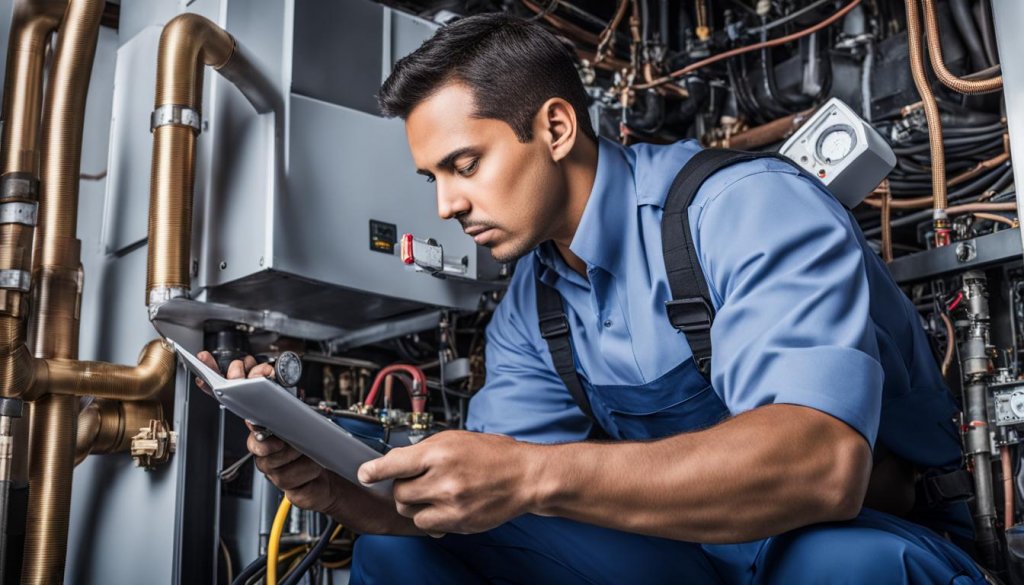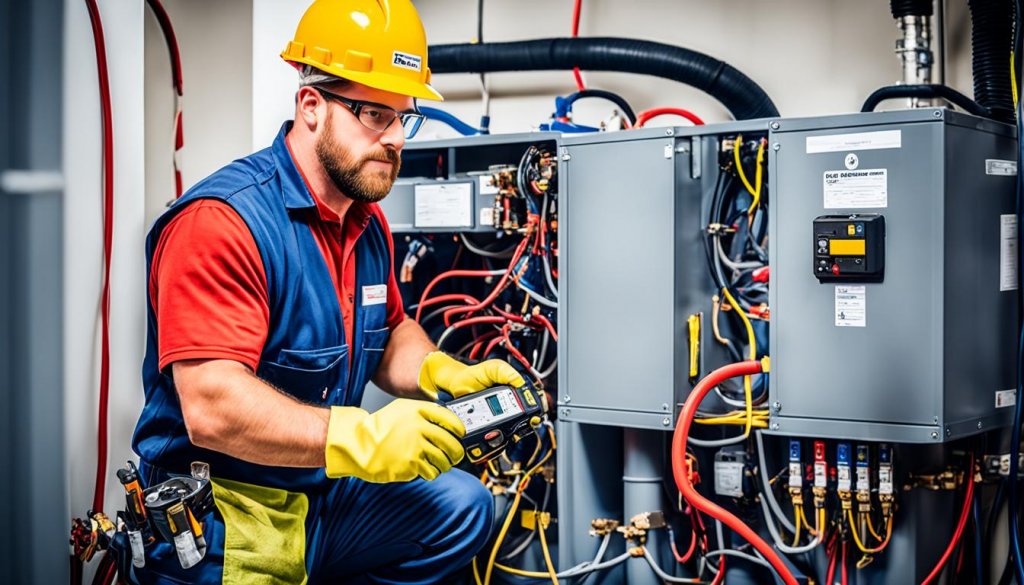Being an HVAC technician puts me face-to-face with unique challenges daily. In the field of heating, cooling, and air conditioning repair, many skills are crucial. A particular experience always reminds me what’s important for every HVAC technician.
On a hot summer day, a family called me in a panic. Their air conditioning had stopped working, and they wanted relief from the heat. When I arrived, the heat from inside the house was overwhelming. The family looked stressed and hoped I had a solution.
I quickly spotted a faulty component in the furnace’s electrical wiring. Thanks to my knowledge of wiring and electricity, I fixed the issue fast. Soon, cool air was flowing again, bringing visible relief to the family.
That day showed me how important a wide skill set is for an HVAC technician. It also made clear the significant impact we have on our clients’ comfort and well-being. To succeed, HVAC technicians need to know a lot. This includes electrical systems, reading blueprints, and doing preventative maintenance.
In this article, we’ll explore the top 10 key skills every HVAC technician needs. We’ll cover expertise in wiring and electricity, pumping and piping, and preventative maintenance. We’ll also discuss reading blueprints, testing equipment and tools, understanding safety protocols, computer skills, problem-solving, managing time, and providing good customer service. With these skills, HVAC technicians can do their jobs well and help those in need.

Key Takeaways:
- Expertise in wiring and electricity is crucial for HVAC technicians.
- Pumping and piping skills are highly valued in the industry.
- Maintenance is vital for the smooth operation of HVAC systems.
- Reading blueprints allows technicians to understand installation processes.
- Proficiency in testing equipment and tools is necessary for HVAC technicians.
1. Wiring and Electricity
Knowing about electrical theory is key for an HVAC technician. This includes basics like voltage, circuits, and wiring. Even if HVAC techs don’t focus on electrical jobs, being able to handle a thermostat or choose the right circuit breaker is important. Employers look for these skills.
Electrical theory helps techs find and fix electrical problems in HVAC units. They learn how to connect and disconnect parts correctly. Knowing how to read wiring diagrams is crucial for fixing issues safely.
One important aspect of wiring and electricity in HVAC systems is the thermostat. A thermostat manages temperature and controls HVAC functions based on what the user wants. Correct wiring is key to accurate thermostat communication. This ensures comfort and energy efficiency.
Selecting the appropriate circuit breaker is crucial for AC installations. Circuit breakers keep the electrical system safe from overloads and short circuits. Choosing and fitting them correctly protects the AC and lowers the risk of electrical fires.
Key Points:
- Understanding electrical theory is essential for HVAC technicians.
- Proficiency in wiring and electricity allows technicians to troubleshoot and diagnose electrical issues.
- Technicians must follow safety protocols when dealing with electrical connections.
- Wiring a thermostat correctly ensures optimal HVAC system functionality.
- The appropriate selection and installation of circuit breakers protect the AC unit and prevent hazards.
Common Wiring and Electricity Terms
| Term | Definition |
|---|---|
| Electrical Theory | The study of electrical principles, including voltage, circuits, and wiring. |
| Wiring Diagram | A schematic representation of electrical connections in a system, used for troubleshooting and installation. |
| Safety Protocols | Procedures and guidelines designed to prevent accidents and ensure the safe handling of electrical systems. |
| Thermostat | A device that automatically regulates temperature based on user settings, typically used in HVAC systems. |
| Circuit Breaker | A protective device that automatically interrupts electrical flow in the event of an overload or short circuit. |
2. Pumping and Piping
In the HVAC world, knowing about pumping and piping is key. An HVAC technician must understand how these systems work. It’s important to know how a centrifugal pump links with parts like boilers and chillers.
Being good at this means more than just installing and fixing stuff. It’s about keeping everything running smoothly. This includes spotting problems early and fixing them to keep the system efficient.
Handling pumping and piping well is a big part of HVAC success. Understanding how a pump works with other parts ensures fluids move right. This is vital for heating, cooling, and air flow in buildings.
Installation, Maintenance, and Repair
Setting up pumping and piping needs careful work. Techs must know how each piece fits together, avoiding leaks. They must use fittings and valves correctly.
To avoid breakdowns, regular checks are necessary. This means looking at filters, fluid levels, and the pipes themselves. Catching problems early helps the system last longer.
If something goes wrong, techs need to fix it fast. They might have to work on electrical parts or replace broken ones. Quick repairs keep the HVAC running without pause.
3. Preventative Maintenance
I work as an HVAC technician and know how crucial it is to do regular maintenance. This makes sure HVAC and refrigeration systems run well in homes and businesses. Checking these systems often stops problems, saves energy, and keeps them working longer.
When I check the systems, I carefully look at the refrigerant. I make sure it’s at the right level and check for leaks. Fixing leaks early helps avoid expensive fixes later and keeps the system running smoothly.
Checking for leaks is also very important. I carefully look for any leak signs to make sure the system is sealed right. Fixing leaks fast is key to saving energy and keeping the air clean.
Testing the thermostat is a big part of keeping systems in good shape. I make sure it’s set right so the temperature is controlled well. This helps the system use energy better. I also clean the condenser to get rid of dirt that can stop it from working right.
Maintenance Checks Checklist
| Steps | Description |
|---|---|
| Refrigerant Inspections | Check refrigerant levels and identify any leaks |
| Leak Inspections | Thoroughly inspect the system for leaks and seal any identified leaks |
| Thermostat Tests | Ensure accurate temperature control by checking thermostat calibration |
| Condenser Cleanings | Remove dirt, debris, and obstructions from the condenser |
By keeping up with these maintenance tasks, I help clients save money and energy. They also have cleaner air in their properties. Doing these checks lets me spot and fix issues before they turn into big problems.
The Importance of Preventative Maintenance
Preventative maintenance is key for HVAC and refrigeration systems to work their best. Property owners get a lot of benefits from regular checks:
- Improved energy efficiency: Regular maintenance makes HVAC systems use energy better, cutting costs.
- Extended system lifespan: Catching small problems early helps avoid big breakdowns and adds years to the systems’ lives.
- Enhanced indoor air quality: Regular checks stop pollutants from building up, making the air healthier to breathe.
- Reduced repair costs: Fixing small issues early saves money on future repairs.
Spending on preventative maintenance keeps people comfortable and healthy. It also helps the planet by cutting down on wasted energy.
4. Read Blueprints
Understanding how to read blueprints is essential for HVAC technicians. This skill helps in understanding how HVAC systems are installed. It’s important, whether dealing with new constructions or existing buildings. Technicians need to know construction blueprints, schematics, and other plans to find out where HVAC parts should go.
Technicians look at the building’s layout through blueprints. They figure out where things like vents and ductwork need to be. By looking at electrical diagrams, they understand how to connect the HVAC to power and other systems.
Schematics and drawings show the size and setup of HVAC equipment. This is key for putting things in right and keeping them running. Plus, knowing where water and gas lines are from utility plans is crucial. It can affect the HVAC system.
Being able to read these documents helps technicians install HVAC systems well. They see how parts fit and work together. This makes sure the system works right and uses energy well.
Benefits of Reading Blueprints for HVAC Technicians:
- Accurate understanding of HVAC system installation requirements
- Efficient planning and execution of HVAC projects
- Effective troubleshooting and problem-solving during system repairs and upgrades
- Improved collaboration with other professionals involved in construction and maintenance projects
- Informed decision-making regarding equipment placement and system configuration
Knowing blueprints, schematics, and other plans well is a big plus for HVAC technicians. It helps HVAC systems in homes and places of work run smoothly and last a long time.
| Keyword | Definition |
|---|---|
| Read blueprints | The ability to interpret construction blueprints, schematics, utility plans, mechanical drawings, and electrical diagrams to understand HVAC system installation requirements. |
| Construction blueprints | Detailed plans and drawings that depict the layout and structure of a building, including HVAC system components. |
| Schematics | Visual representations of HVAC equipment, showing the connections and flow of electrical and mechanical systems. |
| Utility plans | Diagrams that illustrate the location and layout of utilities such as water lines, gas lines, and electrical systems. |
| Mechanical drawings | Detailed illustrations depicting the size, dimensions, and connections of HVAC equipment. |
| Electrical diagrams | Visual representations of the electrical connections and circuitry of an HVAC system. |
5. Testing Equipment and Tools
As an HVAC technician, I use many testing tools that are key for my work. These tools help me find out what’s wrong with HVAC systems. I often use tools like acetylene torches and leak detectors.
Acetylene torches are strong and handy for tasks like welding. They can make flames as hot as 6,000 degrees Fahrenheit. This is great for fixing metal parts in HVAC systems. Acetylene torches allow for precise, strong, and lasting repairs.
Leak detectors are essential in my toolbox. They help me quickly find leaks in HVAC systems. Whether the leaks are in air conditioners or furnaces, I can find them fast. Fixing leaks right away helps avoid more damage and keeps systems running well.
The Importance of Proficiency in Testing Equipment and Tools
Knowing how to use different testing tools well is key in the HVAC job. Having the right tools means I can do my work efficiently and save resources. Also, using these tools right makes sure I fix things correctly. This makes customers happy and brings success in the long run.
Being skilled with testing tools like acetylene torches and leak detectors is vital for an HVAC technician. They allow me to do my job well and keep HVAC systems safe, reliable, and lasting a long time.
6. Safety Protocol
Working safely is key for HVAC technicians. We must always think safety first, for us and our team. It is valued by employers when technicians are well-trained to avoid dangers at work.
The Section 608 Technician Training from the Environmental Protection Agency is vital. It lets HVAC techs handle refrigerants without harming the environment. This training teaches them how to deal with refrigerants correctly.
Techs also need training on other risks at work. This includes handling chemicals, using ladders, and working in bad weather. These skills help prevent accidents and keep everyone safe.
Following safety rules shows we care about our work and keeping others safe. Employers look for techs who make safety a priority. They want people who take steps to avoid accidents.
Certifications for Safety and Workplace Hazards
Here are some certifications that focus on safety and dealing with dangers at work:
- National Safety Council (NSC) Certifications: They cover first aid, CPR, and more, proving a technician’s dedication to a safe workspace.
- Occupational Safety and Health Administration (OSHA) Certifications: OSHA offers courses on specific dangers like hazardous materials and safety in wiring. These highlight a tech’s knowledge in keeping the workplace safe.
Getting these certifications helps HVAC techs stand out. It shows their dedication to making the workplace safer.
| Certification | Key Focus Areas |
|---|---|
| Section 608 Technician Training | Refrigerant handling Environmental regulations |
| National Safety Council Certifications | First aid CPR Workplace safety Defensive driving |
| Occupational Safety and Health Administration (OSHA) Certifications | Hazardous materials Electrical safety Fall protection |
By valuing safety and earning the right certifications, HVAC techs protect themselves and uplift our entire industry. Safety is crucial in our job. Actively preventing dangers is key to being a skilled and ethical HVAC technician.

7. Computer Skills
As an HVAC technician, knowing basic computer skills is key in today’s high-tech world. Checking email, researching online, and typing are crucial for staying on top of your tasks. These skills help you keep organized and efficient every day.
Computer skills also mean you can use online platforms important to the HVAC field. You may need to look up technical details on manufacturer websites. Or find online training resources and order parts.
Google Maps is another important tool for HVAC technicians. It helps you find job sites quickly, choose the best travel routes, and spot nearby suppliers. This app is very useful for your daily travels.
Technology in HVAC systems is advancing fast. Knowing how to set up and fix systems that work with apps is important. These modern HVAC systems have features like remote monitoring. You need to be good with mobile apps to handle them.
In summary, computer skills like using email, browsing the web, typing, and using Google Maps are vital for HVAC technicians. These skills help you stay efficient and organized. Keeping up with new technology, especially in HVAC systems, also sets you apart in the field.
Conclusion
Becoming skilled in HVAC is a journey of learning and growing. It requires a strong dedication to education and improvement. With new technology and standards, technicians must keep up with the latest training and certifications.
Updating their skills lets technicians offer top service to customers. They can learn a lot at seminars, conferences, and workshops. These events are great for finding new trends and making connections.
Building a strong network can lead to new job chances and guidance. This shows a commitment to being the best in the HVAC world. By taking these steps, technicians can stay on top of changes. They can offer great service and succeed in this exciting area.
See how FieldAx can transform your Field Operations.
Try it today! Book Demo
You are one click away from your customized FieldAx Demo!
FAQ
What skills should an HVAC technician have?
An HVAC technician must know about wiring and electricity. They should be skilled in pumping and piping, and preventive maintenance. They need to be good at reading blueprints, testing equipment, and following safety rules.
They should also have computer skills, be great at solving problems, manage their time well, and provide excellent customer service.
Why is knowledge of wiring and electricity important for an HVAC technician?
Understanding wiring and electricity helps an HVAC tech wire thermostats correctly. They can choose the right circuit breakers. It ensures AC units are installed safely.
How does knowledge of pumping and piping benefit an HVAC technician?
HVAC techs need to know how centrifugal pumps link to components. This includes boilers, chillers, and cooling towers. It’s vital for proper installation and upkeep.
Why is preventative maintenance a crucial skill for an HVAC technician?
Regular checks on HVAC systems help spot and fix issues early. This keeps them running smoothly. It also stops costly repairs.
Why is it important for HVAC technicians to be able to read blueprints?
Blueprint reading lets HVAC technicians get the setup right. They can find the best places for HVAC parts in buildings.
Why is proficiency in testing equipment and tools important for an HVAC technician?
HVAC technicians work with tools like torches and leak detectors. Being skilled with these tools is crucial. It helps in tasks like welding and finding leaks.
Why is safety protocol an important skill for HVAC technicians?
Following safety rules keeps HVAC techs safe and prevents accidents. Training like the Section 608 Technician Training is also needed to handle refrigerants safely.
How do computer skills benefit HVAC technicians?
Basic computer skills are necessary for tasks like checking emails and typing invoices. Tech advancements in HVAC also need techs to know how to install and repair new models that work with apps.
Why is continuing education important for HVAC technicians?
HVAC technicians should continually learn and get new certifications. Keeping up with the latest in the field helps improve their skills. It also helps them excel in their careers.
Author Bio
Co-Founder & CMO at Merfantz Technologies Pvt Ltd | Marketing Manager for FieldAx Field Service Software | Salesforce All-Star Ranger and Community Contributor | Salesforce Content Creation for Knowledge Sharing






